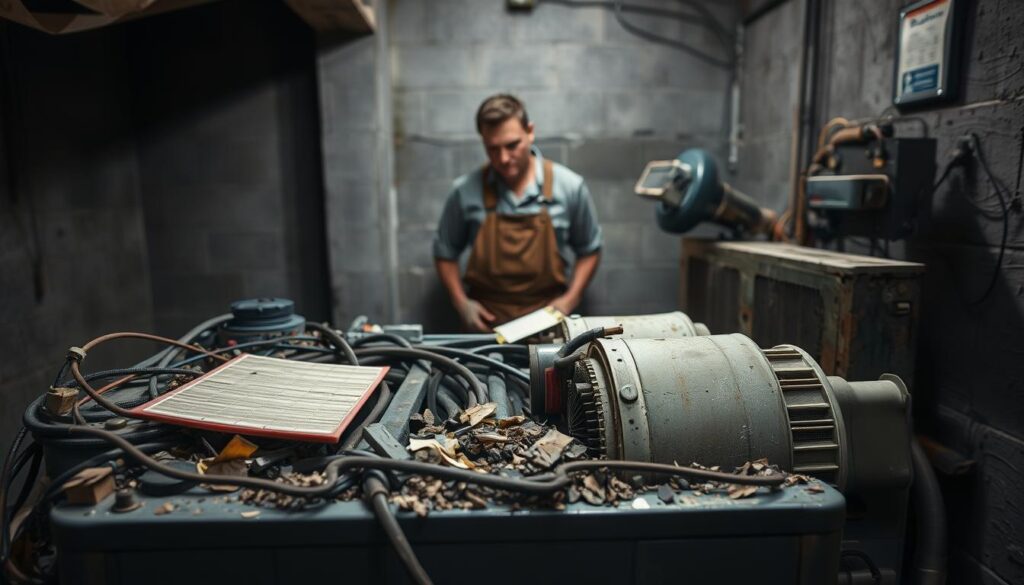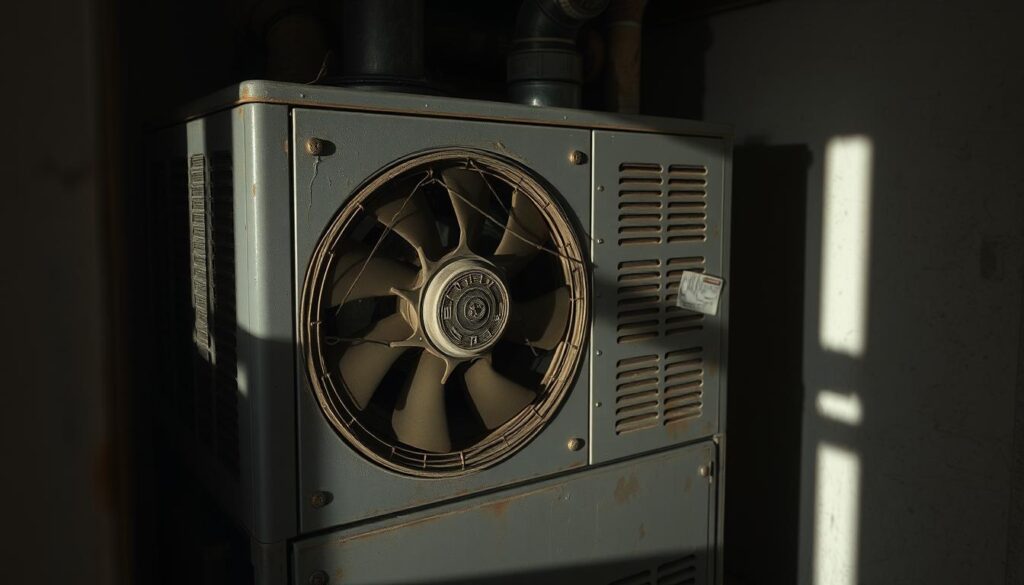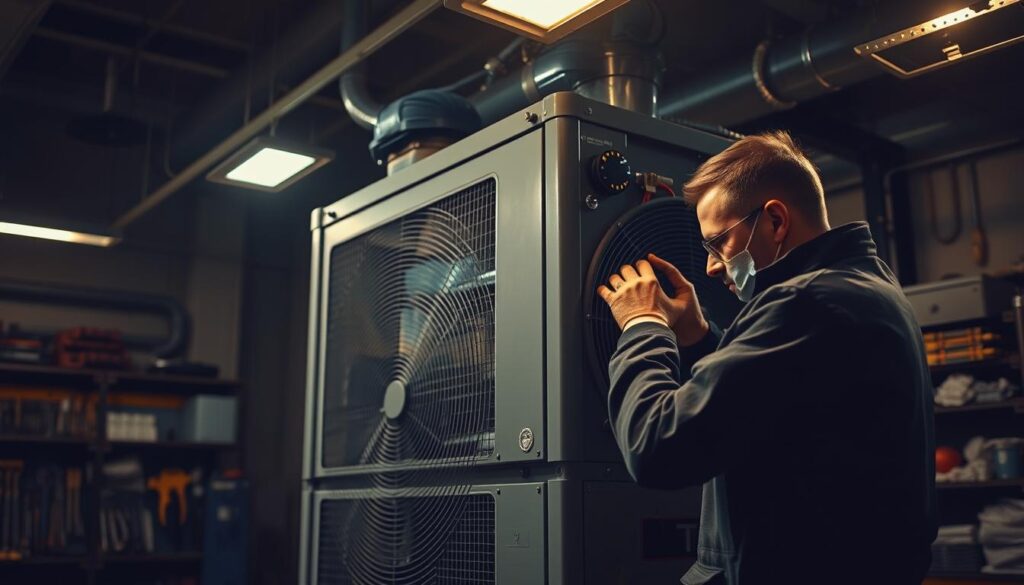Affiliate Disclosure
HVAC Guide Guys is a participant in the Amazon Services LLC Associates Program, an affiliate advertising program designed to provide a means for sites to earn advertising fees by advertising and linking to Amazon.
Why Is My HVAC So Loud? A noisy air conditioner is more than just a nuisance. It usually means there’s a mechanical problem that needs fixing right away. Modern HVAC systems are made to run quietly. So, if yours is loud, it’s a sign of trouble.

Ever felt like your home turns into an industrial machine when the HVAC turns on? Figuring out why your HVAC is so loud can save you from costly repairs. It also brings back peace to your home.
Many things can make your HVAC system noisy. From mechanical wear to airflow problems, it’s important to catch these issues early. This helps keep your system running smoothly and avoids expensive fixes.
Key Takeaways
- Loud HVAC systems may indicate serious mechanical problems
- Normal operating sounds differ from unusual loud noises
- Regular maintenance helps prevent excessive sound issues
- Some noises require professional HVAC technician evaluation
- Addressing noisy air conditioner causes quickly can prevent major repairs
Table of Contents
Understanding Normal HVAC Operation Sounds
Knowing the difference between normal and abnormal sounds in HVAC systems is key. Your heating and cooling unit makes some sounds when it’s working. But, knowing these sounds can help spot problems early.
Most modern HVAC systems are made to be quiet. They usually make sounds between 19 to 50 decibels. This is as quiet as a library or a soft whisper. For comparison, a normal conversation is about 60 decibels.
Expected Noise Levels from Modern HVAC Systems
Here are some common sounds from a loud HVAC unit:
- Gentle whooshing of air through vents
- Soft humming from the compressor
- Minor clicking during startup and shutdown
- Low-level vibration during active cooling or heating
Typical Operating Decibel Ranges
Different parts of the HVAC system make different sounds:
- Compressor: 40-60 decibels
- Fan motors: 25-40 decibels
- Air handler: 35-55 decibels
“If you must raise your voice to be heard over your HVAC system, it might be generating excessive noise.”
Standard Sounds During Regular Operation
Your HVAC system will always make some background noise. Sounds that are rhythmic and consistent usually mean it’s working right. But, sudden, loud, or irregular noises could mean there’s a mechanical issue that needs a pro to check.
Explore Our HVAC Shop
Looking for top-rated HVAC tools, parts, and accessories? Visit our shop and find the perfect solution for your needs.
Visit the ShopWhy Is My HVAC So Loud: Common Causes Explained
When your furnace makes loud noises, it’s important to find out why. HVAC systems can make different sounds that mean there’s a problem inside.
Several key factors contribute to excessive HVAC noise:
- Worn mechanical components
- Loose or damaged parts
- Airflow restrictions
- Aging system infrastructure
Your HVAC system’s noise can mean it needs maintenance. Ignoring unusual sounds might lead to more expensive repairs and less efficiency. Loose parts can make banging or rattling sounds. Restricted airflow can cause whistling or humming.
To reduce HVAC noise, consider these possible problems:
- Blower motor misalignment
- Damaged fan blades
- Worn bearing mechanisms
- Accumulated debris in system
Professional HVAC technicians can find and fix these noise issues. They make sure your system runs quietly and well. Regular maintenance helps avoid loud noises and keeps your system working longer.
Different Types of HVAC Noises and Their Meanings
Your HVAC system talks to you through sounds. Knowing these sounds can help you find problems early. Air conditioner rattling sounds are not just annoying. They’re warning signs that something might be wrong.
It’s important to know the different HVAC noises. This helps with keeping your system quiet. Let’s look at the most common sounds you might hear:
Banging and Clanking Sounds
Loud banging or clanking means serious problems inside. These sounds often point to:
- Broken or loose compressor components
- Damaged connecting rods
- Failing motor mounts
- Loose internal system parts
Squealing and Screeching Noises
High-pitched squealing sounds usually mean:
- Worn-out fan belts
- Failing motor bearings
- Lack of proper lubrication
- Misaligned pulleys
Rattling and Vibration Issues
Persistent rattling can point to several problems:
- Loose external panels
- Debris in ductwork
- Unbalanced fan blades
- Deteriorating internal components
| Noise Type | Potential Cause | Recommended Action |
|---|---|---|
| Banging | Broken Compressor Parts | Professional Inspection |
| Squealing | Worn Fan Belts | Belt Replacement |
| Rattling | Loose Components | System Tightening |
Pro Tip: Never ignore unusual HVAC sounds. Quick action can save you from expensive repairs and keep your system running longer.
Mechanical Components That Cause Excessive Noise
Your central air system can be loud due to certain mechanical problems. Knowing what these parts are can help you find and fix the noise issues early.
The main mechanical causes of loud HVAC systems are:
- Blower Motor Problems: Worn bearings or misalignment can create grinding or squealing sounds
- Compressor Issues: Failing compressors produce loud banging or rattling noises
- Fan Blade Damage: Bent or loose blades create unbalanced spinning and excessive noise
- Bearing Wear: Metal-on-metal contact generates high-pitched screeching sounds
Each part in your HVAC system is important for its performance. When these parts wear out or get damaged, they can make a lot of noise and lower system efficiency.
Regular maintenance is essential to avoid these noise problems. Getting professional inspections can spot issues early. This can save you from costly repairs and keep your HVAC system quiet and efficient.
Professional HVAC technicians recommend annual system check-ups to catch mechanical wear before it becomes a significant problem.
Air Flow and Ductwork Related Sound Issues
Understanding why your HVAC is so loud often leads to discovering underlying airflow and ductwork problems. Noisy air conditioner causes can frequently be traced back to issues within your home’s ventilation system. These sound problems not only disrupt your comfort but can also indicate efficiency challenges with your HVAC system.
Blocked Vents and Filters: Silent Noise Generators
Restricted airflow creates significant stress on your HVAC system. Blocked vents and dirty filters force your system to work harder, generating unnecessary noise. Here are key indicators of airflow restrictions:
- Uneven room temperatures
- Increased system vibration
- Higher energy consumption
- Whistling sounds from vents
Comprehensive Ductwork Problem Analysis
Ductwork issues can transform a quiet HVAC system into a noisy nightmare. Loose connections, improper sizing, and accumulated debris contribute to unexpected sounds.
| Ductwork Issue | Potential Sound | Recommended Action |
|---|---|---|
| Loose Connections | Rattling | Professional sealing |
| Metal Expansion | Popping | Insulation installation |
| Debris Accumulation | Whistling | Thorough cleaning |
Air Pressure Imbalances: The Hidden Sound Culprit
Pressure variations within your HVAC system can create unexpected noises. Balanced air pressure is key for quiet operation. Professional assessment can help identify and resolve these pressure dynamics, ensuring your system runs smoothly and silently.
Explore Our HVAC Shop
Looking for top-rated HVAC tools, parts, and accessories? Visit our shop and find the perfect solution for your needs.
Visit the ShopImpact of Age and Wear on HVAC Noise Levels

As your HVAC system gets older, it can get much louder. It’s important to understand how wear and tear affect noise levels. This knowledge helps in fixing the problem effectively.
Older HVAC systems tend to make more noise for several reasons:
- Worn bearings in motors
- Loose internal components
- Degraded mechanical parts
- Accumulated dust and debris
Most HVAC systems last between 10-15 years. Over time, they can go from being quiet to very loud. This change can make your home less comfortable.
Key parts that make noise include:
- Compressor wear causing vibration and grinding sounds
- Fan blade misalignment creating uneven rotation
- Damaged belts producing squealing noises
Regular maintenance can help reduce noise from aging. Getting a professional to check your system every 1-2 years can catch problems early. This keeps your HVAC system quiet and efficient.
“A well-maintained HVAC system is a quiet HVAC system” – HVAC Professional Insight
If your system is always noisy and needs repairs often, it might be time for a new one. New HVAC systems are much quieter and use less energy.
Professional Solutions for Noisy HVAC Systems
Dealing with a noisy furnace can be really frustrating for homeowners. Professional HVAC technicians can fix this problem. They make sure your system works well again. It’s important to know when to call for help to keep your heating and cooling in top shape.
When to Call an HVAC Professional
You should call an HVAC technician if you notice:
- Persistent loud or unusual sounds from your furnace
- Banging, grinding, or screeching noises
- Vibrations that seem excessive or concerning
- Reduced system efficiency
- Unexplained increases in energy bills
Common Repair Solutions
Professional technicians can fix noisy furnaces in several ways:
- Component Replacement: They replace worn-out belts, bearings, or motor parts
- System Lubrication: They reduce friction in moving parts to cut down noise
- Ductwork Inspection: They check and fix air leak sources
- Balancing Fan Assemblies: They ensure proper alignment to reduce vibrations
Regular maintenance by professionals can reduce HVAC noise. It also extends your system’s life and keeps energy use low. Catching small problems early can save you from big, expensive repairs later.
Explore Our HVAC Shop
Looking for top-rated HVAC tools, parts, and accessories? Visit our shop and find the perfect solution for your needs.
Visit the ShopPreventive Maintenance to Reduce HVAC Noise

To keep your HVAC system quiet, regular maintenance is key. Air conditioner rattling sounds often come from neglected equipment. A good maintenance plan can greatly reduce noise and boost your system’s performance.
Regular upkeep is vital for quieter HVAC systems. Here are important steps to keep your system in top shape:
- Replace air filters every 1-3 months
- Clean outdoor unit and surrounding areas
- Lubricate moving mechanical components
- Check and tighten loose mounting brackets
- Inspect ductwork for air leaks
Professional tune-ups are critical for thorough system care. HVAC technicians can spot noise issues early. Annual professional inspections can prevent unexpected breakdowns and reduce long-term repair costs.
Your maintenance plan should mix DIY tasks with professional services. Pay attention to unusual sounds and fix them quickly. Clean systems run quieter, more efficiently, and last longer.
“A well-maintained HVAC system is a quiet HVAC system” – HVAC Professional Wisdom
By investing in preventive maintenance, you can cut down on air conditioner rattling sounds. This ensures a peaceful and comfortable home environment.
Conclusion
Fixing a loud central air system is key to keeping your home comfortable and efficient. Knowing why your HVAC is noisy helps you take steps to reduce the sound. This also prevents damage to your system.
Start by keeping up with regular maintenance and listening to your system. If you hear odd noises, don’t ignore them. Small problems can turn into big, costly repairs if not fixed soon. A professional can find and fix most noise issues before they get worse.
Your HVAC system is a big investment. Regular checks, quick fixes, and maintenance keep it quiet and working well. Being alert to your system’s performance helps it last longer and keeps your home comfortable.
Every unusual sound from your HVAC means there’s a problem. Listen to your system, get it checked by pros, and keep up with maintenance. This way, your central air system will run quietly and efficiently.

